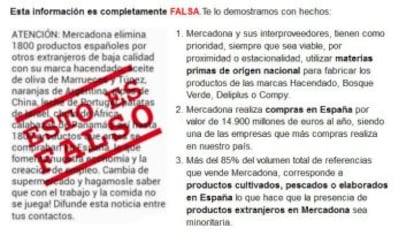Mercadona reveals suppliers to fight claims of ditching Spanish produce
Supermarket chain says online accusations it is favoring low-quality imports are “false”

Mercadona, Spain’s largest supermarket chain, has come out against online accusations that it is switching Spanish-produced goods for foreign-made, lower-quality products.
“You may have read on the internet or received information through social media indicating that Mercadona is eliminating Spanish products in favor of foreign products, or that Spanish products are being taken off the shelves at Mercadona. This information is completely FALSE,” reads the company release, available on its website.
The online message exhorts consumers to “change supermarkets and let them know that you don’t play around with jobs and food!”
The company then goes on to detail exactly who makes the goods that it sells under its own brands, which include Hacendado (food) and Bosque Verde (household cleaning products).
Mercadona issued an extensive note to counter “the hoax” accusing it of buying as many as 1,800 products from foreign suppliers.
It is no secret that the Valencia-based, family-owned company partners with firms that work almost exclusively for Mercadona. Every year, CEO Juan Roig thanks them for their work and lists them in the company’s annual report.
Mercadona says it has 120 suppliers with 220 factories and also has long-term agreements with 12,000 fishermen, 6,000 farmers and 4,000 livestock breeders across Spain for its fresh products.
The anonymous online message claims that Mercadona has traded in 1,800 Spanish products “for foreign ones of low quality.” It specifies that the olive oil comes from Morocco, the oranges from Argentina, the sunflower seeds from China, the pumpkins from Panama and the potatoes from Israel.

The online message exhorts consumers to “change supermarkets and let them know that you don’t play around with jobs and food!”
But the Mercadona release explains that its olive oil is bottled by a provider in Seville and is 100% Spanish “as indicated on the label and accredited by the independent agency Det Norske Veritas (DNV-GL). In order to make our Hacendado oil, Mercadona works with over 150 cooperatives and oil presses from differents parts of Andalusia, Extremadura, Castilla-La Mancha, the Valencian region, Catalonia, Madrid and Murcia.”
As for oranges, the company notes that 90% are Spanish, with Argentinean ones imported only between August and November, when they are no longer grown in Spain or else the ones available are not of sufficient quality.
Similarly, the potatoes on sale in Mercadona are Spanish except between November and April, when homegrown potatoes do not meet Mercadona’s standards and are imported from different climes.
“In 2014, the company bought €14.9 billion worth of products in Spain,” said the company.
Founded in 1977 as a butcher’s shop in a Valencia village, Mercadona has remained in the Roig family and expanded nationally to reach over 1,100 supermarkets and 70,000 employees. The company has received plaudits for its early embrace of innovative techniques and fair employment practices. During the economic crisis, Mercadona expanded and hired thousands of new workers.
English version by Susana Urra.
Tu suscripción se está usando en otro dispositivo
¿Quieres añadir otro usuario a tu suscripción?
Si continúas leyendo en este dispositivo, no se podrá leer en el otro.
FlechaTu suscripción se está usando en otro dispositivo y solo puedes acceder a EL PAÍS desde un dispositivo a la vez.
Si quieres compartir tu cuenta, cambia tu suscripción a la modalidad Premium, así podrás añadir otro usuario. Cada uno accederá con su propia cuenta de email, lo que os permitirá personalizar vuestra experiencia en EL PAÍS.
¿Tienes una suscripción de empresa? Accede aquí para contratar más cuentas.
En el caso de no saber quién está usando tu cuenta, te recomendamos cambiar tu contraseña aquí.
Si decides continuar compartiendo tu cuenta, este mensaje se mostrará en tu dispositivo y en el de la otra persona que está usando tu cuenta de forma indefinida, afectando a tu experiencia de lectura. Puedes consultar aquí los términos y condiciones de la suscripción digital.








































